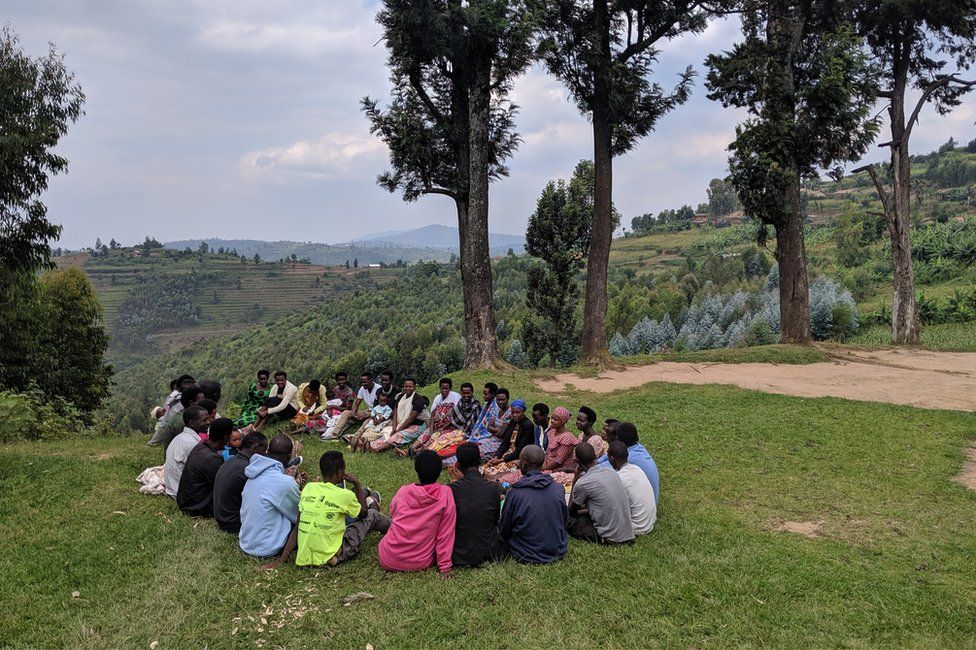
Continuing our series of articles from our Annual Report 2024/25, we outline here our work on our Young Survivors Counselling Project.
Thousands of youthful survivors of the 1994 genocide are only now confronting the horror of seeing their families murdered. They struggle to make ends meet, alone and vulnerable, prone to depression and hopelessness.
Through support from our partner Network for Africa (N4A) we are working with AERG to train counsellors who in turn train local people to become counsellors. The counsellors are themselves survivors who have endured trauma, so they are familiar with the challenges faced by people with depression and other mental health issues. The counsellors are coordinated by SURF Senior Key Worker, Emilienne Kambibi.
During 2024, support was provided to the youth who survived the 1994 Genocide against the Tutsi, in the two districts where the project runs – in Rwamagana District in the Eastern Province and Huye District in the Southern Province. The purpose of the activities was to treat trauma symptoms and related psychological problems by building resilience, positive thinking together, and working for a better future.
At the start of 2024, Network for Africa’s (N4A) staff counsellors recruited 300 participants from Rwamagana District and Huye District, 113 of whom were male and 187 females. The participants were classified into 12 groups according to their sectors. The sectors were mainly in the Southern Province in the Huye district, Tumba (A&B), Ruhashya (A&B), Rusatira, and Mbazi and in two sectors (Munyaga and Gahengeli) of the Rwamagana District in the Eastern Province.
Twenty-four peer support counsellors (PSCs) 12 males and 12 females were selected to be trained in trauma counselling for 4 days and how to lead their groups during the year. Baseline and endline surveys were conducted with 60 participants (24 males and 36 females) and 8 (4 males and 4 females) key informers were interviewed at the start of counselling services and its end. 262 group counselling sessions were conducted. 117 participants (38 males and 79 females) were helped through individual counselling in the fourth quarter of the year 2024 alone.
In the 2024, counsellors joined with participants to remember the Genocide against the Tutsi on the 30th commemoration, to remember their families on different sites. 35 participants (30 females and 5 males) faced a trauma crisis, but all recovered. 37 home visit sessions were provided by counsellors for family therapy. Conflict resolution, and psychoeducation was made available to 24 participants (5 males and 19 females). During the different visit sessions, PSCs visited group members 322 times at their homes.
Community awareness in secondary schools was provided to 869 students. The purpose was to give them knowledge about mental health, prevent drug abuse and antisocial behaviours. The events were also attended by 93 parents who also benefited from talking about how to managemental health issues and family conflict. An additional 1,033 people in the community were sensitized about mental health issues. PSCs helped 73 families in the community with unresolved conflict through resolution. Fifteen cases were resolved by counsellors. These conflicts were rooted in negative use of the family property (lands), infidelity, drug abuse, and neglect of duty.
B.C *
B.C is 39 years old illegally married man with one child. He completed only primary school. He lives with his mother, his father. He lost many members of his family during the 1994 Genocide against Tutsi. After completing the counselling group, he was asked how he felt after one year in the counselling group.
“When I first joined the group, I didn’t know what I would gain from it. On my first day in the group, I felt ashamed because I was dirty and drunk. I was surprised by the warm welcome I received, which encouraged me to come back in the following sessions with clean clothes and without having drunk.
“I received help because I couldn’t sleep well. I had nightmares that woke me up suddenly, I was always on edge. I used to carry with me a stick and stones for self-defence. I often quarrelled with my mother, demanding property to sell for alcohol. I neglected my family (my wife and child), and my friends were only those I drank with. After receiving counselling, I began a journey of transformation. I reduced my alcohol consumption, and peace returned to my family. Now, I take care of myself, maintaining personal hygiene and wearing clean clothes. I’ve made new friends from the group who don’t drink and support me in my journey. I no longer carry stones and try to return home early. Though I haven’t fully recovered, I believe I will, because I’m determined to change. I realized I lost so much and am ready to fight to regain what I’ve lost.”
B.C has been encouraged to reach out to his group members for support or call SURF’s toll-free hotline for counselling to continue his journey whenever he feels unwell, as he still needs assistance.
